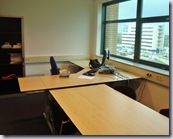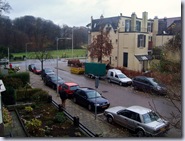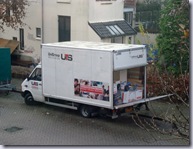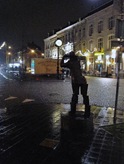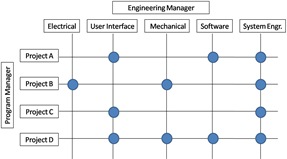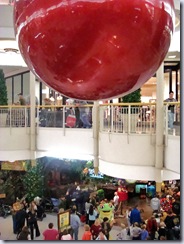SnowSprouts
 The Dutch woke to snow this Saturday morning.
The Dutch woke to snow this Saturday morning.
It’s not a common thing here: the climate is temperate marine, much like Seattle, and winters are similarly dark and wet. When snow showers blow in, it frosts trees and walkways for a few hours, then subsides to wet slush by mid-afternoon.
Thus, any snow day becomes an occasion. Children, bundled and booted, run to the park to jump in puddles, roll up a sneeuwpop (snowman), sled down the hills, and catch snowflakes on their tongues.
Childhood should be filled with moments like these. As a parent, time spent with the kids sledding and having snowball fights is precious (mine turned 19 today, but it still doesn’t seem so long ago that we pushed and rolled in the snow). Kids know that snow is the perfect medium for building forts and caves, slides and sculptures. The creative urge is only abandoned in adolescence when we discover winter’s greater potential as a race track for skiing and tobogganing.
I remember riding the chair lifts in Colorado with my brothers, listening to the trees crack in the cold, assessing the skiers below, planning routes through the colored lines of the trail maps…starting blue (red in Europe), a black interlude, finishing fast. We could complete 20 or more runs in a day, top to bottom, reading the lift lines to minimize waits, scanning the runs for moguls and chutes.
I was reminded me again of how social media increasingly challenge our kid’s engagement with the real world.  In the US, for example, PBS is kicking off Sprout, a new 24-hour television channel for “pre-social” children (ages 2-5). it combines “trusted, gold-standard shows with fresh and innovative originals, following the day of a preschooler from breakfast to bedtime, with daytime programming designed to get children moving and active and evening programming to help the family gently unwind...”
In the US, for example, PBS is kicking off Sprout, a new 24-hour television channel for “pre-social” children (ages 2-5). it combines “trusted, gold-standard shows with fresh and innovative originals, following the day of a preschooler from breakfast to bedtime, with daytime programming designed to get children moving and active and evening programming to help the family gently unwind...”
This is a sad evolution for kids and a challenge for adults. The resource pages are undoubtedly helpful, but as a practical matter, toddlers and pre-K’s grow and develop and learn and gain confidence by interacting with the world, with friends, with caregivers, not with a television or computer.
And, even though it’s made by PBS with high standards for what sponsors can add messages in what ways, the sugary temptations and consumer-driven socialization is still present. It just seems young, and it seems like it has the potential to get in the way of so much else.
‘Watching the kids playing in the snow today, families out enjoying the brief wonder of winter in the park together, I really hope that there aren’t too many parents bundling their kids away with Sprout.
And, enjoying the rare treat of a fresh snowfall in the forest, I hope that their parents aren’t missing out on the fun, either.
Labels: Cross-Cultural Contrasts, Everyday life in the Netherlands







